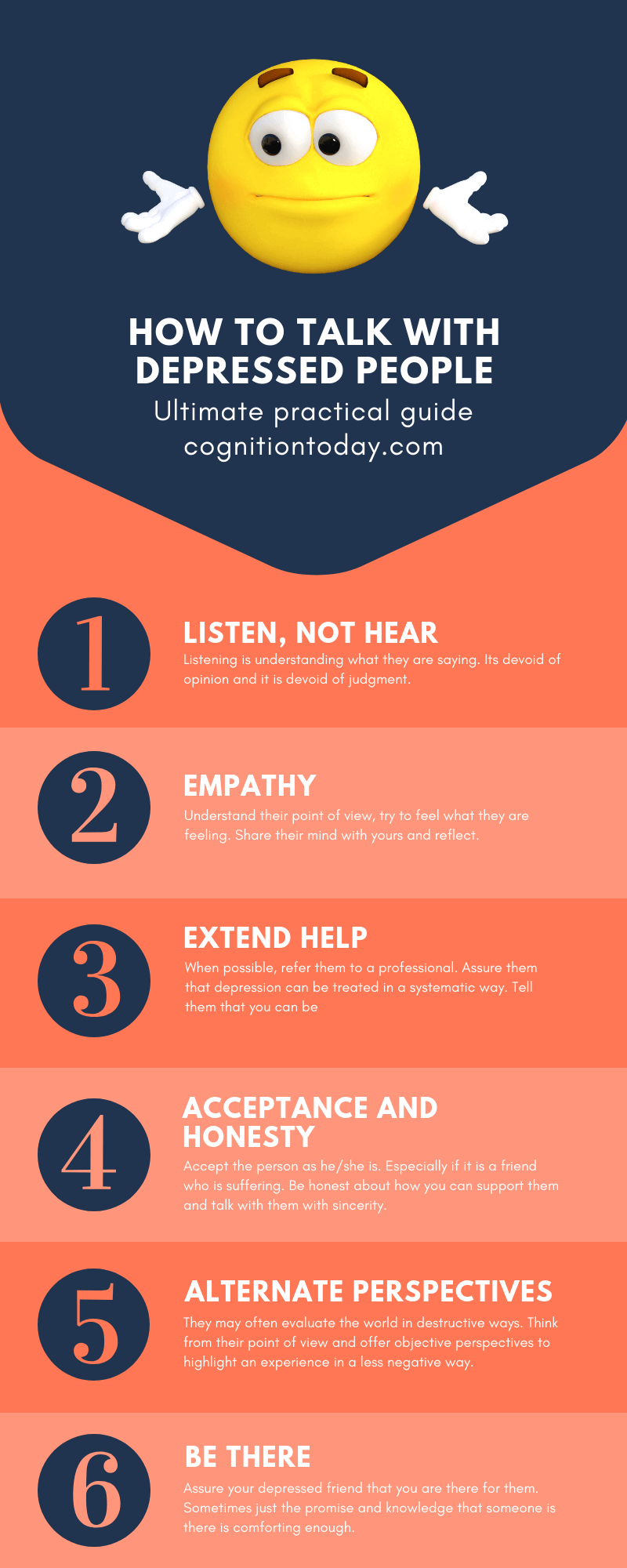What to say to a depressed person – 30 examples.
In the previous article, I went through 15 sentences that you should not use while talking to depressed people. Those sentences are commonly used and are pretty unhelpful. If you haven’t read that article, I recommend going through that after this one. Here, we will look at how to talk with a depressed friend. You’ll see that the guidelines are not just for helping the depressed but can also be used to up your communication game.
Before we get to the 30 sentences, I’ll cover some general intentions that people should have while communicating with people experiencing a mood disorder or a depressive phase.
Disclaimer: This is NOT a guide to therapy or clinical treatment. This is a guide to what individual non-professionals can do to help their depressed friends. Let us assume that you are open to talking with depressed people first. And then, let me assume that you want to help them in any way you can.
Highlights on what depression is:
Depression is a prolonged state of physical and mental low. Sleep and eating habits change. There is lack of motivation in many facets of life. The world is viewed in a less positive way than objectivity warrants. There is a rigid thinking pattern that harms the person’s well-being. It is not sadness or grief. It is not a fleeting mood. It is not something that can be changed on a whim.
To treat depression, one needs to actively work on their mental, social, professional, and physical health.
Guidelines to help a depressed friend/person:
1. Listening: One of the key issues that people with depression face is that they try to reach out to people and feel that other’s don’t understand what they are going through. So my first recommendation is purely listening. Listening comes in 2 parts:
- Hearing and comprehending what they are saying
- Asking short questions to further your understanding of what they are saying.
It is important to focus on listening at length. Hearing a statement and then responding immediately is not listening. Let them speak and you’ll see that within a few sentences, they paint a picture for you. The very act of them speaking and you listening helps them.
2. Empathy: Empathy is the ability to share the thoughts and feelings of another person. It is about you thinking and reflecting on their perspective. Try to understand their situation as they are seeing it. This goes hand in hand with listening. When you listen and then respond, let your response be empathetic. Use sentences which paraphrase what they are feeling, thinking, and experiencing.
These are the key components of extending empathy:
- Seeing someone else’s point of view
- Removing the influence of your own influence
- Articulate your reflection of their point of view
- Avoid advice, suggestions, recommendations, opinions, in that reflection. Any form of judgment is destructive.
*Empathy is different from sympathy – sympathy is feeling sorrow for someone else. Empathy is understanding and feeling what someone else shares with you.
3. Extending help: Let’s begin with a harsh truth. Everyone is not capable of extending useful, actionable, and professional help. What do you do when you aren’t a professional in mental health?
You can extend help by:
- Listening & not judging
- Empathy
- Referring them to a professional
- Declaring that you are there for someone
- Showing that they can rely on you for company
Just the idea of offering support, in an abstract way, can also be useful. It’s the intention of what you are offering that counts. At the end of this article, I’ve listed sources for offering help.
4. Being there: Being there for someone entails actively offering support and a robust declaration of empathy, acceptance, and understanding. Although it is not always easy to extend professional help, the promise of being there is enough on many occasions. As you are ‘there for them’, leave judgment of any type aside. Let them know you can rely on them.
5. Honesty & acceptance: Honesty (and sincerity) is needed in how you can be there for someone. False promises of being there are destructive. Imagine, you declare that you are there for the person. Your depressed friend already has feelings of abandonment[1] and feels a little secure knowing you are there for them. But, you fail to do so. This reinforces the feelings of abandonment. Be welcoming and let them not feel isolated from everything.
Acceptance is straightforward acceptance of what the person was before depression, how they are during depression, and how they want to be after they overcome depression. Accept them (and their voice) without judgment.
6. Alternative perspectives: This is tricky. You’ve been warned. Do this carefully. Depression changes how people think and they often evaluate the world in negative and unfavorable ways that harm their self-esteem and self-concept[2].
- Self-esteem: The feelings and attitude one has toward oneself. This includes the confidence (or lack thereof) in one’s abilities.
- Self-concept: The ideas and knowledge about oneself.
So what is offering alternate perspectives? When a depressed person tells you about their experiences and accounts for their view of it, you might notice that they are seeing things negatively. You may be right. However, that is how the depressed person sees it. From their point of view, it isn’t wrong.
What you can do is offer an alternate, favorable perspective on the same event. Perhaps how you are seeing it, perhaps a third person perspective, perhaps just a rephrasing of their experience in a less negative light. Account for the story objectively without making it look like devaluing their point of view. If you would still like to help them with advice, I suggest speaking about these 8 strategies that can make them happy.
Disclaimer: The above link is not a cure. Those strategies make your life conducive to happiness, which is useful regardless of depression.
What to say to depressed people- sentences
Examples of sentences to use while talking with depressed people.
- I’m here to know what you are feeling.
- Please tell me, if you are comfortable, what you are going through.
- I’m listening.
- It must be hard feeling this way every day.
- I can only imagine that you are going through a lot.
- Tell me more, I want to know the details.
- You can be comfortable sharing, I’m just here to listen.
- So what did you feel when _____ happened?
- Do you often feel this way about ____?
- Help me understand what you are going through.
- Do you want to share something more with me?
- I am trying to see it from your point of view.
- Tell me if I understand you correctly.
- Can I help in any way?
- Let me try to rephrase what you are saying. Then, rephrase.
- I want to assure you that I am not here to judge or give my opinion.
- I’m there for you.
- You can always turn to me if you need someone to just listen.
- I can’t tell you what to do, but I would suggest meeting a professional. They would know.
- There are ways to treat depression, you can create the life you want. Please go meet a professional who will help you with it.
- I’m a little concerned. Will you seek professional help?
- Thanks for sharing. Here is how I see it.
- Do you think there are other ways to understand your experience? Venture into alternate perspectives objectively.
- Your feelings are valid. I feel that even though they are valid and true, they may be harming you.
- I extend my support to you. I’ll do what I can.
- Don’t worry, you can get through this and have a healthier mental life. It would take some work and it is worth it.
- I understand we all see things differently. What is true for me won’t be true for you. And what is true for you won’t be the same for me. Maybe seeing it from a different perspective might help.
- Is there any other perspective you can have about your experience?
- Is it possible that it happened This way? Offer an alternate perspective.
- I may not understand the gravity of what you are going through. I want you to know that I accept you and what you are sharing with me.
Bonus sentence:
I’m there for you, unconditionally. We are friends, and you have judgment-less acceptance from me.
So these are examples you can use. Feel free to translate (with caution).
Infographic: how to help a friend with depression

Practical guide on how to talk someone with depression
This sums up the practical guide. We’ve discussed the intentions & principles behind talking constructively with a depressed person and have covered 30 sentences that will help you achieve that.
Points of caution:
- Even though your intentions are true and good, evaluate what you are trying to say. Make sure it is received by others correctly. Elucidate.
- Don’t paint a false picture. No one likes disappointments even though they may accept them.
- Be sincere and genuine.
- When you are trying to help a friend with depression, your job is not treating depression. It is to be a friend. So don’t try to treat them.
- A depressed person might feel that others are trying too hard to make them feel good or try to help. Sometimes, just be normal around them. Engage with each other as you’d do on a typical day. They’d appreciate normal hangouts. After all, they are human.
- Depressed people are not seeking pity, so don’t show pity.
- If you are casually hanging out and having fun, let it be casual hanging and having fun. A forced conversation about one’s depression might not be the best idea. Nor would constantly making every hangout about depression be the best idea.
- Understand when space is required even when you are hanging out with a depressed person. No nagging, no pushing.
Summary:
Go ahead, now you know how to help a friend with depression- with some listening power and empathy! Accept them, extend help, and offer a way to evaluate the world constructively! Wouldn’t be hard now.
So are you now confident about talking with a depressed friend? They would surely love to have you around!
Here is a resource to seek professional help for depression (India):
International [5]Search for a professional near you (India) [6]
Sources
[2]: https://www.simplypsychology.org/self-concept.html
[3]: http://www.aasra.info/
[4]: https://www.facebook.com/notes/screw-depression/international-helplines/670390192973574/
[5]: https://www.facebook.com/notes/screw-depression/international-helplines/670390192973574/
[6]: https://www.practo.com/

Hey! Thank you for reading; hope you enjoyed the article. I run Cognition Today to capture some of the most fascinating mechanisms that guide our lives. My content here is referenced and featured in NY Times, Forbes, CNET, and Entrepreneur, and many other books & research papers.
I’m am a psychology SME consultant in EdTech with a focus on AI cognition and Behavioral Engineering. I’m affiliated to myelin, an EdTech company in India as well.
I’ve studied at NIMHANS Bangalore (positive psychology), Savitribai Phule Pune University (clinical psychology), Fergusson College (BA psych), and affiliated with IIM Ahmedabad (marketing psychology). I’m currently studying Korean at Seoul National University.
I’m based in Pune, India but living in Seoul, S. Korea. Love Sci-fi, horror media; Love rock, metal, synthwave, and K-pop music; can’t whistle; can play 2 guitars at a time.




























Hey!! Thanks for the post.
Thank you!
Thank you!
Great information.
web designing company